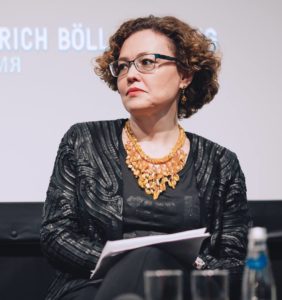 Madina Tlostanova works through the decolonial modernity/(de)coloniality group’s theorisation and the study of race and gender in Europe and Asia, specifically in a post-USSR moment. In this respect, she has developed the concepts of ‘secondary colonial difference’ and ‘external imperial difference’ in conceptualising the relationship between European imperialism and what she terms ‘subaltern empires’ (such as the USSR and the Ottoman Sultanate before it). Accordingly, her work has invited, and contributed toward, a conversation between the Latin American modernity/decoloniality collective’s work and the study of Asia to argue, specifically, that race is the global structuring force of modernity which metamorphoses and conceals itself under various banners, including class difference, to thwart potential for emancipation. Writing across languages, including Russian and French, Tlostanova has in this respect urged Russian-speaking academia to engage with coloniality and modernity’s racialised order for resistance.
Madina Tlostanova works through the decolonial modernity/(de)coloniality group’s theorisation and the study of race and gender in Europe and Asia, specifically in a post-USSR moment. In this respect, she has developed the concepts of ‘secondary colonial difference’ and ‘external imperial difference’ in conceptualising the relationship between European imperialism and what she terms ‘subaltern empires’ (such as the USSR and the Ottoman Sultanate before it). Accordingly, her work has invited, and contributed toward, a conversation between the Latin American modernity/decoloniality collective’s work and the study of Asia to argue, specifically, that race is the global structuring force of modernity which metamorphoses and conceals itself under various banners, including class difference, to thwart potential for emancipation. Writing across languages, including Russian and French, Tlostanova has in this respect urged Russian-speaking academia to engage with coloniality and modernity’s racialised order for resistance.
On another level, Tlostanova’s work has engaged and contributed to decolonial feminist studies where she has extended the ‘colonaility of gender’ to the study of Muslim communities in the Caucasus to argue that the gender binary was/is a European colonial imposition enforced on these communities as part of modernity’s patriarchy. In this respect, Tlostanova argues for the ‘emancipation of feminism’ from modern parochialism for global dialogues and alternative futures based on (various) indigenous cosmologies that have long been denied.
Engaging creative, artistic, and aesthetic work in an academic and activist struggle against modernity/coloniality, Tlostanova’s work eventually invites a conversation between various regions of the Global South, and the theorisations that emerge from them, for a better conceptualisation and subversion of the modern/colonial structures in place.
Essential Reading:
Tlostanova, M., 2014. How “Caucasians” became black? Imperial difference and the symbolization of race. Personality. Culture. Society 16(3-4), pp. 96–115.
Tlostanova, M., 2015. Can the post-soviet think? On coloniality of knowledge, external imperial and double colonial difference. Intersections. East European Journal of Society and Politics 1(2), 38–58.
Further Reading
Tlostanova, M., 2018. The Postcolonial and the Postsocialist : A Deferred Coalition? Brothers Forever? Postcolonial Interventions: An Interdisciplinary Journal of Postcolonial Studies III, 1–37.
Tlostanova, M., 2015. Postcolonial theory : the decolonial option and postsocialist writing. Brill Academic Publishers, pp. 25–45.
Tlostanova, M., 2010. Gender Epistemologies and Eurasian Borderlands, Comparative Feminist Studies. Palgrave Macmillan US.
Tlostanova, M., 2013. Gender and decoloniality. Löcker Verlag, pp. 141–144
Tlostanova, M., Mignolo, W., 2012. Learning to Unlearn : Decolonial Reflections from Eurasia and the Americas. Ohio State University Press.
Questions:
1. How does Tlostanova contribute to and inspire a productive conversation between Latin America and the Caucasus as two regions of the Global South?
2. How does Tlostanova’s work voice the post-Soviet and develop the conceptualisation of global coloniality by doing so?
3. What is the relationship between decolonising knowledge and decolonising art for Tlostanova?
4. What forms of political activism to subvert Euromodernity does Tlostanova’s work advance and where/how does art enter into this?
Submitted by Ali M Kassem